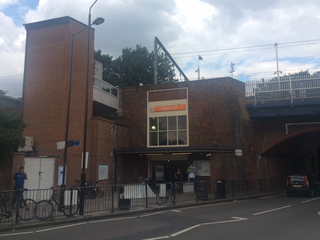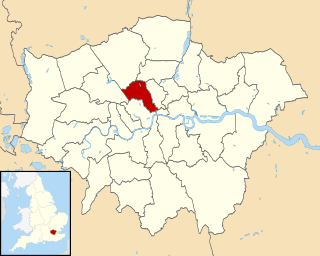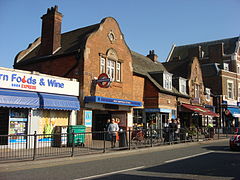
Finsbury Park is an intermodal interchange station in north London. It serves a number of National Rail, London Underground and bus services. The station is the third busiest Underground station outside Zone 1, with over 33 million passengers using the station in 2019.

Highbury & Islington is a London Underground and National Rail interchange station in the London Borough of Islington, north London. It is served by the London Underground's Victoria line and the Great Northern's Northern City Line, as well as the London Overground's East and North London Lines.

Camden Town is a London Underground station on the Northern line. It is a major junction for the line, as it is where the Edgware and High Barnet branches merge from the north, and is also where they split to the south into the Bank and Charing Cross branches for the journey through Central London. It is particularly busy with visitors to the Camden markets at weekends, and, until 2019, was exit-only on Sundays to prevent overcrowding.

The North London line (NLL) is a railway line which passes through the inner suburbs of west, north-west, north, and east London, England between Richmond in the south-west and Stratford in the east, avoiding central London. Its route is a rough semicircle.

West Hampstead is a London Underground station in West Hampstead. It is located on West End Lane between Broadhurst Gardens and Blackburn Road and is situated in Travelcard Zone 2. It is on the Jubilee line between Kilburn and Finchley Road stations. It is 100 m (110 yd) from West Hampstead station on the London Overground North London line and 200 m (220 yd) from West Hampstead Thameslink station. Metropolitan line trains also pass through the station, but do not usually stop.

Kentish Town is a London Underground and National Rail station in Kentish Town in the London Borough of Camden. It is at the junction of Kentish Town Road (A400) and Leighton Road. It is in Travelcard Zone 2. The station is served by the High Barnet branch of the London Underground Northern line, and by Thameslink trains on the National Rail Midland Main Line. It is the only station on the High Barnet branch with a direct interchange with a National Rail line; furthermore an Out of Station Interchange (OSI) with Kentish Town West on the North London line is not charged as two separate journeys in electronic journey charging.

Gospel Oak railway station is in the London Borough of Camden in north-west London. It is on the North London line (NLL) and is also the western passenger terminus of the Gospel Oak to Barking Line – known informally as GOBLIN. Passengers using Oyster cards are required to tap on interchange Oyster card readers when changing between the two lines. The station is in Travelcard Zone 2, and is managed by London Overground which runs all passenger trains at the station.

Barking is an interchange station serving the town of Barking, east London. It is served by London Underground, London Overground and National Rail main line services. It is located on Station Parade, in the town centre.

Camden Road railway station in the London Borough of Camden, north London, is operated by London Overground. It is on the North London line and in Travelcard Zone 2.

South Tottenham is a railway station on the east–west Gospel Oak to Barking Line of the London Overground. It is located on the eastern side of the north–south A10 High Road in Tottenham, North London, 5 miles 69 chains (9.4 km) from St Pancras and situated between Harringay Green Lanes and Blackhorse Road. It is in Zone 3, in the London Borough of Haringey. South Tottenham to Seven Sisters station is considered an official out-of-station interchange by the National Rail timetable, and involves a short walk. This link will become fixed under the planned route for Crossrail 2, which sees a double-ended underground station built linking together South Tottenham and Seven Sisters stations.
West Hampstead is an area in the London Borough of Camden in north-west London. Mainly defined by the railway stations of the same name, it is situated between Childs Hill to the north, Frognal and Hampstead to the north-east, Swiss Cottage to the east, South Hampstead to the south-east, Kilburn to the west and south-west, and Cricklewood to the north-west. The area is mainly residential with several small shops, restaurants, cafes, bakeries concentrated on the northern section of West End Lane and around West End Green. It is served by three stations: West Hampstead on the Jubilee line, West Hampstead Overground station and West Hampstead Thameslink station. It is part of the Kilburn postal district (NW6).

Cricklewood railway station is on the Midland Main Line in England, serving the town of Cricklewood in the London Borough of Barnet, north London. It is 5 miles 9 chains (8.2 km) down the line from St Pancras and is situated between West Hampstead Thameslink to the south and Hendon to the north. Its three-letter station code is CRI.

South Hampstead railway station is on Loudoun Road in the London Borough of Camden. It is served by London Overground services on the Watford DC line. It is about 550 yards (500 m) south west of Swiss Cottage Underground station.

The Watford DC line is a suburban line from London Euston to Watford Junction in Watford, Hertfordshire. Its services are operated by London Overground.

London Overground is a suburban rail network serving London and its environs. Established in 2007 to take over Silverlink Metro routes, it now serves a large part of Greater London as well as the home county of Hertfordshire, with 113 stations on nine different routes.

Old Oak Common (OOC) is a railway station under construction on the site of the Old Oak Common traction maintenance depot to the west of London in Old Oak Common, approximately 500 m (1,600 ft) south of Willesden Junction station. When built, it is expected to be one of the largest rail hubs in London, at about 800 m (2,600 ft) in length and 20 m (66 ft) below surface level.

The Dudding Hill Line is a railway line in west and north-west London running from Acton to Cricklewood. It is roughly 4 miles (6.4 km) long, with a 30 miles per hour (48 km/h) speed limit, and semaphore signalling. The line has no scheduled passenger service, no stations, and is not electrified. It is lightly used by freight trains and, very occasionally, passenger charter trains.

East Brixton railway station was a railway station in Brixton, south London. It was opened as Loughborough Park by the London, Brighton & South Coast Railway in 1866. Regular passenger service was the South London line from London Victoria to London Bridge terminal stations in central London. Initially provided with a steam passenger service, competition from electric trams caused a conversion to overhead line electric operation in 1909. The station became part of the Southern Railway in 1923 and overhead line electrification was swapped for third rail in 1928. The station lost patronage after the opening of Brixton Underground station in 1971. There was a fire at the station in 1975 and it was closed by British Rail in January 1976. The station was located next to the rail bridge over Barrington Road, near Coldharbour Lane. Since 2012 London Overground trains pass through the site of the former station without stopping and there has been some campaigning to reopen it.

West Hampstead railway station is a London Overground station on the North London Line between Brondesbury and Finchley Road & Frognal in the London Borough of Camden and is in Travelcard Zone 2.

The London Borough of Camden is a London borough in Inner London. Camden Town Hall, on Euston Road, lies 1.4 mi (2.3 km) north of Charing Cross. The borough was established on 1 April 1965 from the area of the former boroughs of Hampstead, Holborn, and St Pancras—which together, prior to that date, had comprised part of the historic County of London.






















